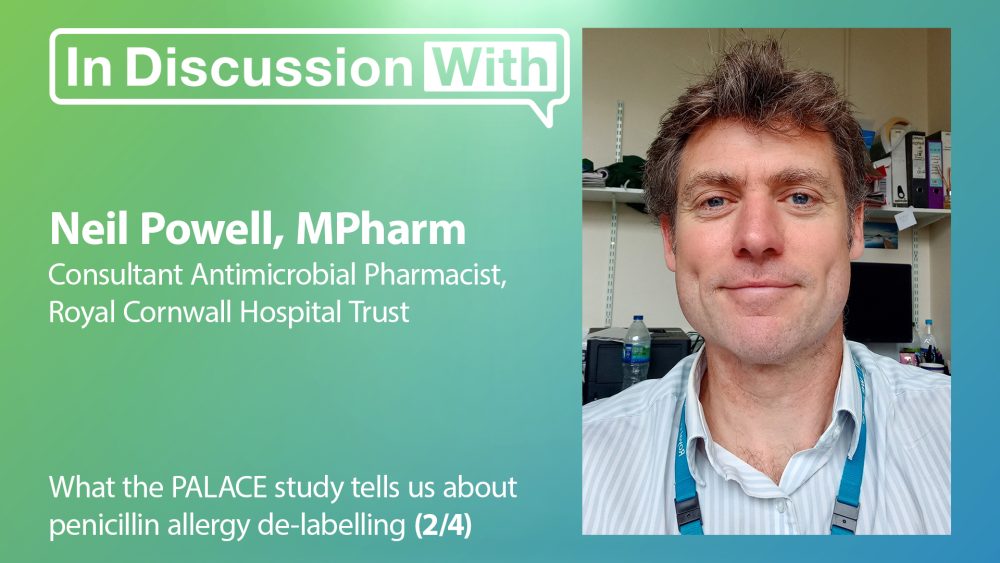Advertisment
What the PALACE study tells us about penicillin allergy de-labelling

The PALACE study showed that in people at low-risk of penicillin allergy, a direct oral challenge with penicillin was no less effective than standard allergy testing for determining their penicillin allergy status, according to Neil Powell, Consultant Antimicrobial Pharmacist, Royal Cornwall Hospital.
Distinguishing who has a genuine penicillin allergy amongst all the people who are labelled as “allergic to penicillin” is an important issue. Traditionally, this has been achieved by referring all individuals labelled as ‘allergic to penicillin’ to an allergist for blood tests (for specific immunoglobulin E (IgE)) and skin prick testing for penicillins. People who were negative for both would then be offered an oral dose of penicillin. “If the patient didn’t react you would say they’ve got no evidence or they’re not going to have an immediate reaction to penicillin. Then, they traditionally were sent home with a few days of penicillin – three to five days – and if there was no reaction at the end of that period then you could remove the allergy record”, explains Mr Powell. This was a resource-intensive procedure and it has gradually become clear that blood tests and skin tests are not required for people at low risk of having a true penicillin allergy. “You don’t need to do the blood test for IgE and you don’t need to do the skin testing because they’re always negative in these low-risk patients”, he says. However, this requires a simple scheme for risk-stratifying people who have been labelled ‘allergic to penicillin’.
The PALACE study was a randomised, controlled trial (RCT) that prospectively looked at the safety and effectiveness of a direct oral penicillin challenge compared with the standard of care penicillin skin testing followed by an oral challenge. The participants were people who had a PEN-FAST score of less than 3. “PEN-FAST is a scoring system that you can use. So, you take an allergy history from a patient and depending what the patient’s allergy history is – if it’s got a score of zero, one or two that that would be deemed a low-risk allergy history”, explains Mr Powell. “What they wanted to do was to test that PEN-FAST decision rule against the current gold standard, which is still skin testing then oral challenge. So, they identified a group of patients prospectively who had a low-risk penicillin allergy – so a PEN-FAST score of less than three – and randomised those patients to go straight to oral challenge or to have skin testing first and then oral challenge to see whether the PEN-FAST rule was as good, if you like, as the gold standard – and the answer is yes, it is”, he says.
By doing a robust, prospective, randomised study in this way the researchers have provided validation of the approach and that will give clinicians more confidence to use it. “The beauty of the PEN-FAST [tool] is that it is quick and easy. It’s a very simple three questions [that] gives you a score – [and you can] do something with it whereas the other tools, maybe you’ve got to ask six questions and it’s a bit more involved …… but the PEN-FAST is quick and easy and it’s numbers based”, he says.
About Neil Powell
Neil Powell is a consultant antimicrobial pharmacist at the Royal Cornwall Hospital. As Associate Director of Antimicrobial Stewardship (or two days a week) he is responsible for ensuring that the hospital is delivering on its antibiotic stewardship program of work. In addition, outside of the hospital he is responsible for ensuring that antibiotic prescribing is appropriate in primary care and the community hospitals. The remaining three days each week are devoted to research – Mr Powell is an NIHR and Health Education England (NIHR/HEE) funded clinical doctoral research fellow.
Read and watch the full series on our website or on YouTube.
This episode of ‘In Discussion With’ is also on Spotify. Listen to the full podcast now.





